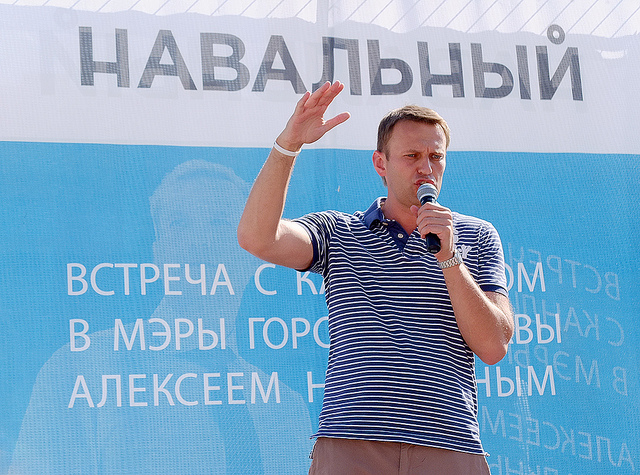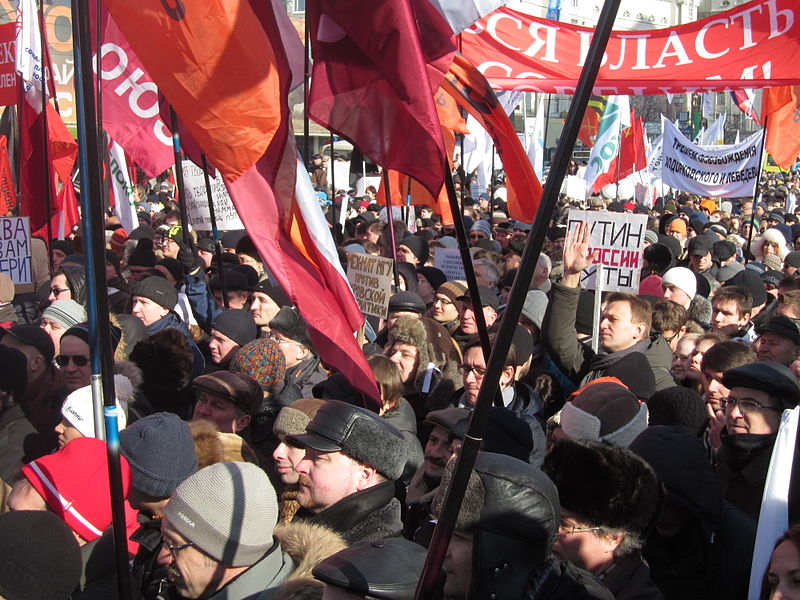Until a few years ago, Alexey Navalny was all but unknown outside Moscow’s small political intelligentsia. But today he may be the most prominent independent critic of the Russian government. In Russia, a nation where Internet use is rapidly rising, Navalny has demonstrated that blogging and social media are powerful political tools. Not surprisingly, Russia’s political establishment has taken note of the upstart blogger. Navalny could well lose his freedom before the summer ends.
In June 2013, Navalny was convicted on embezzling timber from a state-run company while working as an advisor to the Governor of the Kirov oblast. But critics argue that his heavy sentence is the work of Kremlin-orchestrated political repression. Building support through his blog’s large audience, Navalny has defended his innocence online, urging readers to download the full archive of his case’s materials (contained in a 1.7GB downloadable file), which he argues exonerate him. Navalny is also facing public criticism — many of his detractors have mobilized blogs and websites of their own (sometimes designed to mimic the aesthetic of Navalny’s work) to propagate his guilt.
After a brief incarceration following his sentencing (punctuated by a massive street protest in downtown Moscow), the Kirov authorities released Navalny, pending his appeal. If his sentence is upheld, he’ll face five years’ jail time, and the prospect of becoming Russia’s most famous political prisoner. In the meantime, Navalny is a candidate in the Moscow mayoral election, running on a platform of anti-corruption and economic liberalization. (The mysterious conditions under which Navalny was released from jail led many to believe that officials intervened on his behalf, to ensure that he could participate and thus “legitimize” the competition.) Recent polls show Navalny gaining support, though still trailing incumbent mayor Sergei Sobyanin by at least 40 points.
Navalny the Entrepreneur
Alexey Navalny was born in 1976 in Butyn, a town just outside of Moscow. His parents have owned and operated a small furniture factory since the 1990s, an atypical situation in Russia, where entrepreneurship is incredibly low—a result of 70-years-long central planning, Soviet bureaucracy, and rampant corruption. As business owners and members of the middle class, the Navalnys have arguably suffered a great deal from corruption in Russian law and order. Understandably, Navalny’s advocacy as a blogger—and now as a political candidate—has focused on fighting corruption and promoting transparency and economic liberalism.
Navalny, who has a law degree, is a part-owner in his parents’ company, and has helped establish several foundations and institutions since the late 1990s. Since 2011, some of Navalny’s critics have explored whether or not he became certified as a lawyer by hiring himself to fulfill Bar-mandated work experience requirements.
Political Activism and Party Politicking
Although Navalny is now known as a blogger-turned-politician, he was involved with politics long before becoming a LiveJournal sensation. In 2000, he joined the liberal opposition party Yabloko. During the early 2000s, he worked with a similar party, The Union of Right Forces (SPS). Navalny says he joined these groups as a way to push back against Russia’s new electoral laws, which he believed were designed to prevent opposition groups from winning seats in parliament.
Navalny was expelled from Yabloko in December 2007, officially on the grounds that his nationalist views clashed with the party’s values. Navalny, for his part, maintains that he was voted out due to his criticism of Yabloko leader Grigory Yavlinksy, following the party's disastrous performance in the 2007 Duma elections. In a 2011 interview [ru] with Russian GQ magazine, Navalny defended himself and explained that liberals risk permanent irrelevancy in Russia if they make any issue “taboo”:
The failure of our national democratic movement is tied up in the fact that they consider some topics of conversation dangerous to discuss in principle, including the topic of internethnic conflict. At the same time its a major issue of today. We have to admit that migrants, including those from the north Caucasus, often come to Russia with their own set of values.
Despite national indications that Russians widely share his contempt for low-wage-earning migrant workers, Navalny’s nationalist views have been a major liability for the aspiring politician, whose Moscow intelligentsia base is wary of engaging social tensions that often provoke dangerously racist energies.
Blogging for Corporate Accountability
Navalny is a minority-shareholder in several major Russian companies, including oil and gas companies like Rosneft and commercial banks like Sberbank and VTB Bank. He says he first purchased these shares as an investment, but soon became irritated by the low dividends they paid—a fact he ascribed to corruption within the companies. Taking advantage of his shareholder status, Navalny scoured corporate records for evidence of corruption and shared the information on his blog, revealing what he said were clear examples of misappropriation of funds and other forms of corruption. In a 2010 interview with Global Voices, Navalny explained how he used his blog to help coordinate a campaign against corruption at VTB Bank involving the procurement of drilling rigs.
I announced that there were some disturbing facts that I had been investigating. With the help of the blog, I put together other shareholders of VTB Bank who wrote the complaint with me. With its help, I found leasing specialists, experts in drilling rigs, etc. Via the blog, I found other insiders who told me about what is happening now with these drilling rigs. In other words, I fully coordinated the campaign via my blog.
Navalny initiated similar campaigns with Rosneft, Surgutneftegaz, and Gazprom. Inspired by the idea of using the Internet to coordinate an anti-corruption campaign, Navalny then created an organization dedicated to uncovering corruption in state procurements: RosPil [ru].
By law, all state procurements must be posted online [ru]. At Rospil, volunteers search these records for suspicious tenders involving overpriced and/or unnecessary purchases. They then refer a team of professional experts to the most dubious cases, for additional analysis. If the experts consider the tenders to be likely corrupt, RosPil’s legal team issues a complaint to Russia's Federal Antimonopoly Service. According to Navalny, salaries for RosPil's expert team are funded entirely by donations collected online. RosPil claims [ru] that, over two years, its appeals have been responsible for the investigation and/or cancellation of approximately 1.8 billion USD in questionable procurements.
Fighting the “Party of Crooks and Thieves”
Navalny's anti-corruption activities have won him accolades at home. (Russian newspaper Vedomosti listed him as its “Man of the Year” in 2009.) By coining the meme “A Party of Crooks and Thieves” to describe Vladimir Putin’s dominant political party, United Russia, and through his memorable speeches during the 2011-2012 winter protests, Navalny has become the de facto leader of the country’s protest movement. For all his success as an activist and a netizen, however, federal investigators did more than anyone to cement Navalny’s status as a freedom fighter and a household name.
This fame has not brought him universal acclaim. Polling suggests Russians are deeply ambivalent [ru] about Navalny, even if they think [ru] his court case was politically motivated. While his mayoral campaign (which features daily stump speeches throughout Moscow) has demonstrated the disappearing barrier between Russia’s online and offline worlds, Navalny’s odds of winning the election are slim, and a five-year prison sentence looms in the autumn. Despite this, he has drawn together a broad coalition of supporters and mounted a serious run for political office. (Even the Kremlin-friendly think tank, the Civil Society Development Foundation, recently complimented [ru] Navalny for his “very active” effort.) This is an accomplishment in itself and may signal a slowly growing competitiveness in Russia’s public life.











3 comments
Good article!
For anyone interested in learning more about Navalny, you can watch the 15-minute documentary “The Rise of Navalny” at http://www.youtube.com/watch?v=dGAxqw3TT0E.
Also, Navalny’s political platform for the upcoming mayoral election (translated into English) can be read at http://www.contentiouspoliticsrussia.com/2013/07/navalnys-election-platform.html#more.
Personal and Business Loans For Individuals or Companies.
You can go to our website and apply: http://www.possibilitiesconnect.com
Or simply send your loan request by email to: info@possibilitiesconnect.com
Or: possibilitiesconnect@yahoo.com